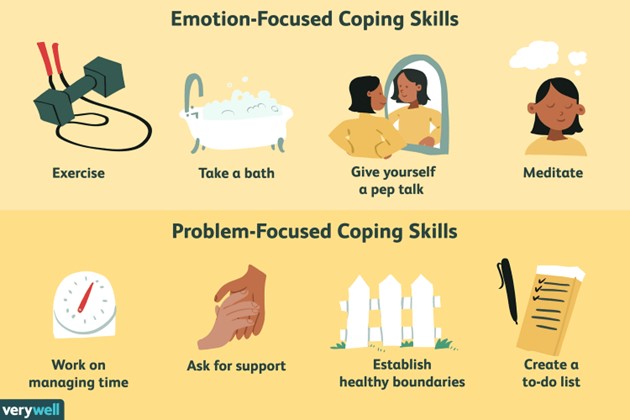A nurse facilitating a group therapy session is listening to clients discuss their coping strategies when feeling stressed. Which of the following statements indicates adaptive coping? (Select all that apply.)
"I sleep in in the mornings."
"I isolate myself in my room for a few hours when things get overwhelming."
"I call a friend who makes me smile and laugh."
"I think about being on my favorite beach vacation."
"I tense and release my muscles, starting with my feet."
Correct Answer : C,E
"I call a friend who makes me smile and laugh," and "I tense and release my muscles, starting with my feet." These are adaptive coping strategies that help to reduce stress and promote relaxation. Calling a friend who makes you smile and laugh, for example, can help to distract from negative thoughts and promote positive emotions. Tense and release exercises can help to reduce muscle tension and promote relaxation.

Choice A, "I sleep in in the mornings," is not an adaptive coping strategy because it doesn't address the source of stress and may actually lead to avoidance.
Choice B, "I isolate myself in my room for a few hours when things get overwhelming," is not adaptive because it promotes social withdrawal and avoidance.
Choice D, "I think about being on my favorite beach vacation," is not adaptive because it promotes avoidance and doesn't address the source of stress.
Nursing Test Bank
Naxlex Comprehensive Predictor Exams
Related Questions
Correct Answer is D
Explanation
Accompany the client when ambulating. The nurse’s priority when caring for a client with alcohol use disorder and who is experiencing withdrawal symptoms is to prevent harm to the client. Physiologic manifestations of alcohol withdrawal syndrome include seizures, delirium tremens (DTs), and hallucinations. Therefore, ensuring the client’s safety is of the utmost importance. Accompanying the client when ambulating is the priority intervention as alcohol withdrawal may lead to ataxia, weakness, and dizziness which may lead to falls.
Choice A, placing the client in a private room, does not address the client’s physical needs.
Choice B, determining the client's level of disorientation, is something necessary to assess but not the priority.
Choice C, padding the side rails of the bed with towels, is not the priority intervention, and contributes little to the prevention of falls.
Correct Answer is B
Explanation
The nurse should recommend establishing a reward system for positive behavior when contributing to the plan of care for a child with an autism spectrum disorder. Reward systems can be particularly effective for children with autism spectrum disorder, as they respond well to structured routines and consistency.
Choice A, assuring that the child has a large variety of caregivers, is not recommended, as children with autism spectrum disorder can be particularly sensitive to changes in routine and caregivers. Providing a flexible schedule to adjust to the child's interests,
choice C may be appropriate in some cases, but a structured routine can be even more beneficial. Allowing for imaginative play with peers without supervision, choice D, may not be safe or effective in all situations. It is important for the nurse to work with the child, their family, and other healthcare professionals to develop an individualized plan of care that meets the child's specific needs and goals.
Whether you are a student looking to ace your exams or a practicing nurse seeking to enhance your expertise , our nursing education contents will empower you with the confidence and competence to make a difference in the lives of patients and become a respected leader in the healthcare field.
Visit Naxlex, invest in your future and unlock endless possibilities with our unparalleled nursing education contents today
Report Wrong Answer on the Current Question
Do you disagree with the answer? If yes, what is your expected answer? Explain.
Kindly be descriptive with the issue you are facing.
